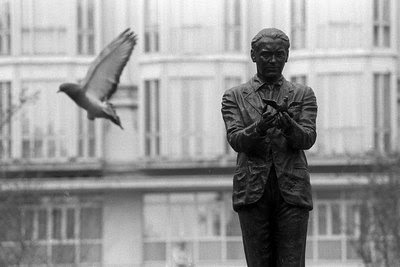Martin Luther King, Jr.
"I Have a Dream" speech | Full text
March on Washington for Jobs and Freedom, August 28, 1963
"I Have a Dream" speech | Full text
March on Washington for Jobs and Freedom, August 28, 1963
Half a century after the March on Washington and the famous “I Have a Dream” speech, the event has been neatly folded into America’s patriotic mythology. Relatively few people know or recall that the Kennedy administration tried to get organizers to call it off; that the FBI tried to dissuade people from coming; that racist senators tried to discredit the leaders; that twice as many Americans had an unfavorable view of the march as a favorable one. Instead, it is hailed not as a dramatic moment of mass, multiracial dissidence, but as a jamboree in Benetton Technicolor, exemplifying the nation’s unrelenting progress toward its founding ideals.Central to that repackaging of history is the misremembering of King’s speech. It has been cast not as a searing indictment of American racism that still exists, but as an eloquent period piece articulating the travails of a bygone era.[...]
When it comes to assessing the political content of the speech, the distinction between segregation and racism is crucial. To the extent that King’s words were about bringing an end to codified, legal segregation, then the dream has been realized. “Whites Only” signs have been taken down; the laws have been struck. Since 1979, Birmingham, Alabama, has had only black mayors. If simply being black—as opposed to the historical legacy of racism—was ever the sole barrier to economic, social or political advancement, that obstacle has been officially removed.But to the extent that the speech was about ending racism, one can say with equal confidence that its realization is not even close. Black unemployment is almost double that of whites; the percentage of black children living in poverty is almost triple that of whites; black male life expectancy in Washington, DC, is lower than in the Gaza Strip; one in three black boys born in 2001 stands a lifetime risk of going to prison; more black men were disenfranchised in 2004 because they were felons than in 1870, the year the Fifteenth Amendment ostensibly secured their right to vote.[...] [T]he speech was clearly more about wider racism than just segregation. By fudging the distinction between the two—or by actively misinterpreting them—it is possible to cast racism as an aberration of the past, as the Supreme Court effectively did when it gutted the Voting Rights Act this past spring. Only then can the vast, enduring differences in the material position of blacks and whites be understood as the failings of individuals rather than the consequences of ongoing institutional, economic and political exclusion.














